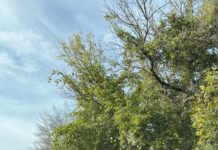by Jim Bertram
“It is not the answer that enlightens, but the question”. (Eugène Ionesco)
Following an initial article, Ceasing to think, which I wrote several weeks ago, very interesting articles by Dr. Joanne Bell and Mr. Paul George were recently presented in this paper. The first article was written by a professional scientist, Dr. Bell, the second by a very alert and questioning layperson with regard to scientific matters. My thanks to both of them for taking the time to air their informative thoughts.
Both of these writers, while proceeding from a different knowledge base relative to scientific matters, deal with the general topic of anthropogenic climate change in a similar manner. Both give primary importance to the questioning or skeptical approach to what we as citizens are given through politicians and the media in the guise of “information”.
Information which rarely rises above the level of mere propagandisation. Which is why we need skepticism.
These writers, Bell and George, understand that the progress of modern science has been gained through an ongoing and competitive process of investigation, hypothesis formation, testing, responding to questions by those skeptical of proposed findings and results of research, re-formulation or rejection of hypotheses where (almost always) necessary, and so on – often in the face of severe opposition by totalitarian regimes or institutions throughout past history. Governments in general do NOT like questions. But most dedicated scientists understand the importance of sharp-witted doubters, skeptics, questioners. Real science, as opposed to official science, thrives on the questions which skepticism brings forth.
Skepticism quite directly leads to sounder procedures in the gaining of knowledge. Ultimately, the skeptical demand for proof, the ongoing questioning process, the desire to examine data, to consult with a variety of top practitioners in the various fields of enquiry, tends toward producing sound knowledge . Knowledge that has been thoroughly vetted. Always with the underlying knowledge that the science will never be settled. Sorry Mr. Gore!
Unfortunately, the “ information age” in which we now live tends to promote neither questioning nor sound knowledge. In the words of the great philosopher of Science, Karl Popper: “We know nothing – that is the first point. Therefore we should be very modest – that is the second. That we should not claim to know when we do not know – that is the third. This is more or less the approach I should like to popularize. It does not have good prospects.”
It would seem, at present, that Popper’s assessment of the prospects for the success of a traditional scientific approach to gaining knowledge is correct – it is not good. The politicisation of science at the highest levels, and the reflection of this politicisation in relatively unchallenged government policies, is dangerous to the future of the country we know as one which, theoretically, is democratic and permits, even encourages, the presentation of questions.
A certain Mr. Voltaire (18th C.), known in his time as a rather wise person, proposed the following: “Judge a man by his questions, rather than his answers”. Given the reaction of some of us, who certainly react badly or worse to questions and the practice of skepticism, Mr. Voltaire would be very surprised to note the very little progress made towards freedom of thought in some quarters in the 21st century. He would, of course, recognise the use of scare tactics, public insults, and a variety of tactics to exclude unwanted points of view, since these very things, and others, were part of the “outillage”(tool kit) applied by the oppressive Royal government of France in Voltaire’s time. Plus ça change, plus c’est la même chose , n’est-ce pas!
Thank you, in any case, to Dr. Joanne Bell and Mr. Paul George, once again, for representing the side of reasonable citizens who will not be shouted down by those who rely largely on unsustainable claims of authority. Such arguments from authority claim “…the science is settled…” In reality, the science involved in understanding atmospheric phenomena has merely made the smallest of beginnings on a long voyage of discovery, if only we will allow ourselves to ask the questions which will permit that voyage.
(Suggested reading: Hubris, Hart,2015 – NG Library 333.709 HART)








